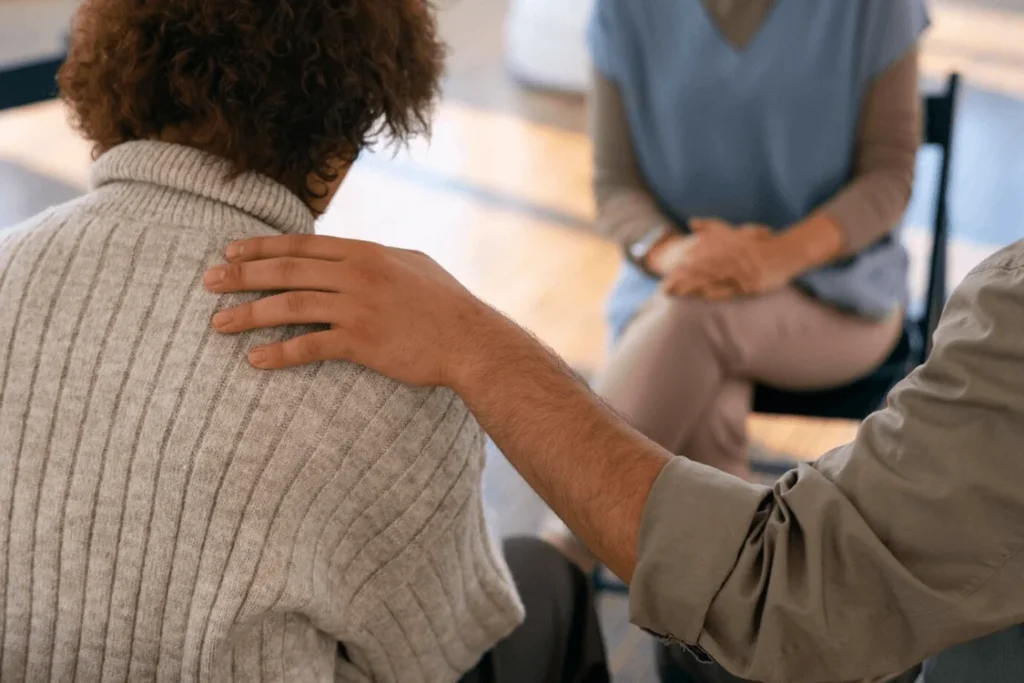
How Does Addiction Affect Families?
The debilitating impact of drug addiction is not limited to the person actively struggling with it – it extends beyond the individual and affects the entire family unit.
Addiction in the household can disrupt family dynamics and cause significant distress among loved ones. Without the right treatment and support, it can potentially damage important relationships and create a cycle of addiction for the rest of the family members.
Understanding Addiction
Addiction, clinically known as Substance Use Disorder (SUD), is characterized by the recurrent use of alcohol and drugs, which significantly impacts an individual’s way of living. This can range from mild to severe cases of chronic relapsing, compulsive alcohol or drug use, and the increasing amount of time obtaining, using, or recovering from the effects of substance abuse.
In 2020, 40.3 million people aged 12 or older had an SUD in the past year, including 28.3 million individuals with an alcohol use disorder, 18.4 million with a drug use disorder, and 6.5 million people who had both. A key indicator of SUD is the continued use of substances despite the array of cognitive, behavioral, and physiological problems it causes.
Several factors can influence the risk of addiction. These include environmental factors (e.g., economic status, peer pressure, exposure to substance use, neglect, or other major life events), genetics, and the interplay between the two. The more risk factors a person encounters, the greater the chance that substance use will lead to addiction.
How Does Drug Addiction Affect Family Members?
Parents
Parents of someone struggling with addiction often experience mixed emotions such as sadness, anger, and pity. They may feel heavily responsible for their child’s behavior, leading to excessive self-blame, guilt, and helplessness.
As parents, they also feel obligated to seek treatment and manage the costs associated with supporting their loved one, which can place considerable financial and emotional strain on the family. In some cases, a parent may even fund their child’s drug or alcohol use, whether out of denial, fear or in hopes of gaining some control over the situation. This can create disagreements and contribute to marital tension and conflicts between family members.
Siblings
Because most of the focus is on the individual struggling with substance abuse, their siblings may feel neglected as attention and resources are often diverted to another family member. At times, siblings may also be forced to take on caregiving roles, even if unprepared, which can lead to frustration and exhaustion. They may feel pressured to compensate for their sibling’s behavior by trying to become the ‘perfect’ child.
Spouse or Partner
A spouse or partner of someone struggling with drug addiction may suffer from emotional turmoil. They may develop trust issues, especially when addiction compels an individual to lie, make broken promises, or cover up their drug abuse.
The emotional burden can also result in codependency, wherein the partner turns a blind eye to harmful behavior caused by addiction in an attempt to save the relationship, even if it becomes one-sided or emotionally abusive. Over time, this dynamic can diminish self-worth and intimacy, making it difficult to maintain a healthy partnership built on trust and love.
Many partners find it hard to decide whether to continue fighting for the relationship or to leave, particularly when the children are involved and affected. The fear of separation, emotional attachment, and financial concerns can make this decision even more difficult.
Children
Children with a parent struggling with drug addiction frequently have to deal with mental anguish, inner conflicts, and developmental setbacks. Since addiction can cause inconsistent and neglectful parenting, children grow up with insufficient and increasingly less support and guidance.
Parents with addiction problems may switch from being loving to being violent or emotionally unavailable, leaving children feeling scared, stressed, and vulnerable. This instability can force children to take on responsibilities and assume caregiving roles for their younger siblings or even the parent struggling with addiction. This can hinder their experience of a normal childhood and lead to feelings of resentment and a heavy burden.
Beyond internal emotional struggles, children may also act out and seek attention by being aggressive, defiant, or engaging in risky behaviors. Research has shown that children who grow up in environments where their parents use substances are at higher risk for mental health and behavioral problems and at an even greater risk of developing drug and alcohol addiction themselves.

Crippling Effects of Drug Addiction in the Family
Financial and Legal Repercussions
One of the most immediate effects of drug addiction is the financial burden it places on both the individual directly involved and their family. These consequences can be extensive, including the accumulation of debt and the depletion of savings. Such expenses often arise from efforts to sustain the addiction, as well as the costs associated with treatment and rehabilitation. Because substance abuse can lead to a variety of physical and mental health issues, ongoing medical care, treatment programs, and hospitalizations may be necessary.
Mounting financial pressure can also cause individuals to default on mortgage payments or resort to illegal activities such as theft, fraud, or embezzlement. It also increases the risk of criminal activities like assault, property damage, driving under the influence (DUI), and other offenses.
Emotional and Psychological Burdens
Living with someone who has an addiction can be both physically and mentally demanding. It often leads to chronic stress, anxiety, isolation, and strained family relationships. The inconsistency and unpredictability of their behavior, such as sudden mood shifts, erratic actions, and constant deceit, can erode trust within the family, develop emotional burnout, and contribute to other mental health problems.
Addiction Treatment Options For Your Loved Ones
Drug addiction is a serious mental health condition, and encouraging your loved one to seek professional help is crucial for long-term recovery. Start by empathising with them, understanding their struggles, and speaking without judgment. Explain how addiction impacts the whole family and how undergoing treatment programs can benefit everyone involved.
Therapy
Cognitive Behavioral Therapy (CBT) is a widely used, evidence-based therapeutic approach for the treatment of drug and alcohol use disorders. This therapy centers on identifying and replacing maladaptive thinking patterns that contribute to substance abuse with healthier alternative ways of thinking.
CBT helps individuals recognize triggers and circumstances that lead to substance use while also teaching them ways to manage stress and handle situations that reinforce such behavior. It promotes emotional regulation, self-control, and the development of effective problem-solving skills crucial for long-term recovery.
Holistic Approach
Holistic treatment is beneficial in many ways, including reducing stress, improving cognitive functioning, managing chronic pain, and enhancing overall health. This method aims to tackle not just the symptoms of addiction but all aspects of an individual’s well-being through a wide range of techniques, such as meditation, yoga, and acupuncture.
Other centers also offer equine therapy, which is a unique holistic approach to addiction that focuses on healing and personal growth through interactions with horses in a peaceful and supportive environment.
Residential Treatment
A residential treatment program offers intensive, round-the-clock care and support from healthcare professionals in a safe, structured environment free from triggers and stressors. It includes personalized treatment plans and integrated approaches to meet your needs.
Residential programs typically last 30 to 60 days, but the duration can be adjusted based on recovery progress and financial considerations.
Outpatient Treatment
If you need comprehensive intervention but want to maintain your daily routine, you can opt for an outpatient treatment program. This approach provides flexible yet structured support, allowing individuals to manage their responsibilities and stay connected to their social network while working on their recovery.
Outpatient treatment is typically more cost-effective than inpatient or residential programs since it does not include accommodation expenses.
Aftercare Treatment
Aftercare in addiction recovery is essential in preventing relapse and maintaining sobriety after completing a treatment program. It ensures continuity of care by facilitating regular check-ins with healthcare providers, therapists, and support groups. This ongoing support gives individuals the resources and assistance they need to navigate setbacks in their long-term recovery.

Help Is Also Available for Family Members
It’s important to recognize that as people involved, family members need care and support too. There are different choices available for families affected by addiction to help them cope and heal.
Individual Therapy
Individual therapy is a personalized approach that offers a safe and private space for family members to address the emotional and mental health challenges of living with someone with an addiction. It helps individuals manage persistent negative emotions and set healthier boundaries to prevent burnout or enabling behaviors.
Through this therapy, family members may gain valuable insights into the true nature of addiction, develop coping strategies, learn to process their thoughts and emotions more effectively, and improve their overall well-being – all while continuing to support their loved one’s recovery.
Group Therapy
Group therapy involves a supportive environment where one or more therapists lead a session with several participants who share similar experiences with addiction. It fosters community and connection, helping family members realize they are not alone in their struggles.
This therapy focuses on mutual support and collective healing while strengthening interpersonal skills and building positive relationships with others. It also helps members develop a deeper understanding of addiction and its impact from a broader perspective.
Family Therapy
Family therapy can promote awareness and educate family members on effectively supporting their loved ones without compromising their well-being. It helps improve communication within the family, which is crucial for resolving conflicts and fostering harmony.
Through this approach, family members can strengthen their relationships and develop healthier coping strategies for managing substance-related challenges.
Where to Get Professional Help
If you or a loved one is battling addiction or is at the receiving end of its consequences, you don’t have to face it alone – help is within reach.
Twilight Recovery offers a compassionate, supportive environment with treatment programs tailored to your specific needs. Our dedicated team of psychiatrists, psychologists, and therapists work collaboratively to guide you through your recovery journey.

